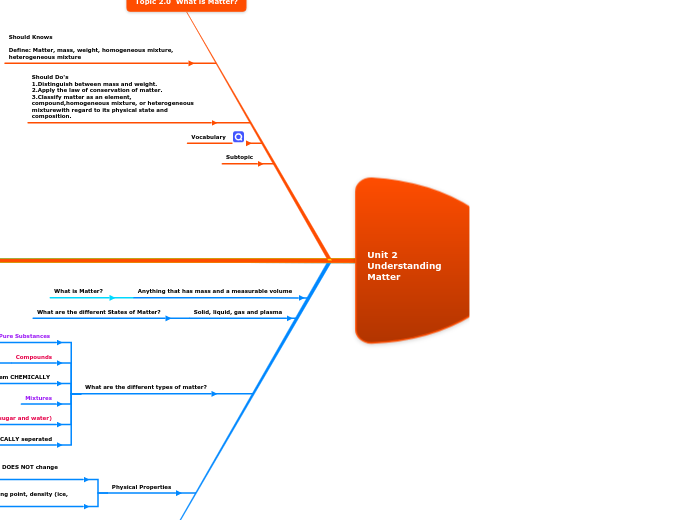Unit 2
Understanding Matter
Topic 2.0 What is Matter?
Should Knows
Define: Matter, mass, weight, homogeneous mixture, heterogeneous mixture
Should Do's
1.Distinguish between mass and weight.
2.Apply the law of conservation of matter.
3.Classify matter as an element, compound,homogeneous mixture, or heterogeneous mixturewith regard to its physical state and composition.
Vocabulary
Subtopic
Topic 2.1 Atomic Structure
What is atomic structure?
Atoms have two major locations
NUCLEUS (center of atom) - Stores protons & neutrons
THE ORBITAL (space around NUCLEUS) - where electrons are
Protons (Atomic Number)
Have a POSITIVE charge
Neurons
Do NOT have a charge
Electrons
Have a NEGATIVE charge
Both Neutrons and Protons are found in the nucleus
ions are atoms of the same element having different charges
isotopes are atoms of the same element having different number of neutrons
Topic 2.1 Physical Vs Chemical CHange
Should Knows
Define: physical property, chemical
Should Do's
1. Describe the difference between physical and chemical changes.
2. Identify metals and nonmetals on the periodic chart.
Mini Lecture 2.0
What is Density
Should Knows
Define Mass, volume and Density
density = amount of mass a substance has in a given volume (g/ml )
volume = the space matter occupies
mass = measurement of matter volume
Should Do's
Solve Density word Problems
1. Manipulate density equation to solve unknown variable
2. Describe how changing in mass influences density if volume remains constant
3. Changing in volumes influence density mass remains constant
Subtopic
Subtopic
Category
Matter
Anything that has mass and a measurable volume
What is Matter?
Solid, liquid, gas and plasma
What are the different States of Matter?
What are the different types of matter?
Pure Substances
Compounds
Elements
ONLY can separate them CHEMICALLY
Mixtures
Homogeneuous (sugar and water)
Heterogeneous (oil and water)
They can be PHYSICALLY seperated
Physical Properties
CAN change the appearance, It DOES NOT change chemical composition
Examples: melting point, freezing point, density (ice, broken pencil)
Chemical Properties
The change of chemical composition in a substance. CAN change appearance AND chemical composition
Examples: rust
